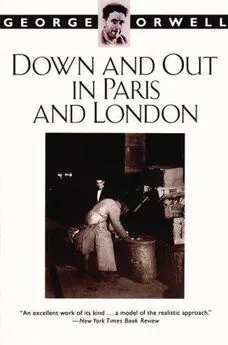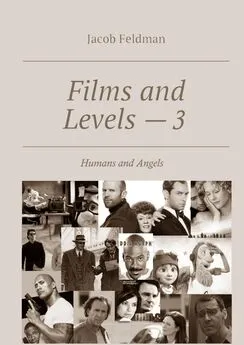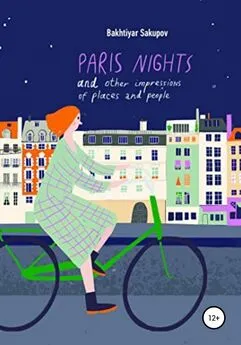George Orwell - Down and Out in Paris and London
- Название:Down and Out in Paris and London
- Автор:
- Жанр:
- Издательство:неизвестно
- Год:неизвестен
- ISBN:нет данных
- Рейтинг:
- Избранное:Добавить в избранное
-
Отзывы:
-
Ваша оценка:
George Orwell - Down and Out in Paris and London краткое содержание
Down and Out in Paris and London - читать онлайн бесплатно полную версию (весь текст целиком)
Интервал:
Закладка:
and we spent it on half a pound of bread, with a piece of
garlic to rub it with. The point of rubbing garlic on bread is
that the taste lingers and gives one the illusion of having
fed recently. We sat most of that day in the Jardin des
Plantes. Boris had shots with stones at the tame pigeons,
but always missed them, and after that we wrote dinner
menus on the backs of envelopes. We were too hungry even
to try and think of anything except food. I remember the
dinner Boris finally selected for himself. It was: a dozen
oysters, bortch soup (the red, sweet, beetroot soup with
cream on top), crayfishes, a young chicken en casserole, beef
with stewed plums, new potatoes, a salad, suet pudding
and Roquefort cheese, with a litre of Burgundy and some
old brandy. Boris had international tastes in food. Later
on, when we were prosperous, I occasionally saw him eat
meals almost as large without difficulty.
When our money came to an end I stopped looking for
work, and was another day without food. I did not believe
that the Auberge de Jehan Cottard was really going to
open, and I could see no other prospect, but I was too lazy
to do anything but lie in bed. Then the luck changed
abruptly. At night, at about ten o'clock,
I heard an eager shout from the street. I got up and
went to the window. Boris was there, waving his stick
and beaming. Before speaking he dragged a bent loaf
from his pocket and threw it up to me.
«
Mon ami, mon cher ami , we're saved! What do you
think?"
"Surely you haven't got a job!"
"At the Hôtel X., near the Place de la Concorde--five
hundred francs a month, and food. I have been working
there to-day. Name of Jesus Christ, how I have eaten!"
After ten or twelve hours' work, and with his game
leg, his first thought had been to walk three kilometres
to my hotel and tell me the good news! What was more,
he told me to meet him in the Tuileries the next day
during his afternoon interval, in case he should be able
to steal some food for me. At the appointed time I met
Boris on a public bench. He undid his waistcoat and
produced a large, crushed, newspaper packet; in it were
some minced veal, a wedge of Camembert cheese,
bread and an éclair, all jumbled together.
"
Voila !" said Boris, "that's all I could smuggle out
for you. The doorkeeper is a cunning swine."
It is disagreeable to eat out of a newspaper on a
public seat, especially in the Tuileries, which are
generally full of pretty girls, but I was too hungry to
care. While I ate, Boris explained that he was working in
the cafeterie of the hotel-that is, in English, the
stillroom. It appeared that the cafeterie was the very
lowest post in the hotel, and a dreadful come-down for
a waiter, but it would do until the Auberge de Jehan
Cottard opened. Meanwhile I was to meet Boris every
day in the Tuileries, and he would smuggle out as much
food as he dared. For three days we continued with
this arrangement, and I lived entirely on the stolen
food. Then all our troubles came to an end, for one of
the plongeurs left the Hôtel X., and on Boris's recom-
mendation I was given a job there myself.
X
THE Hôtel X. was a vast, grandiose place with a classical
façade, and at one side a little, dark doorway like a rat-
hole, which was the service entrance. I arrived at a
quarter to seven in the morning. A stream of men with
greasy trousers were hurrying in and being checked by a
doorkeeper who sat in a tiny office. I waited, and
presently the
chef du personnel , a sort of assistant manager,
arrived and began to question me. He was an Italian,
with a round, pale face, haggard from overwork. He
asked whether I was an experienced dishwasher, and I
said that I was; he glanced at my hands and saw that I
was lying, but on hearing that I was an Englishman he
changed his tone and engaged me.
"We have been looking for someone to practise our
English on," he said. "Our clients are all Americans, and
the only English we know is ---" He repeated something
that little boys write on the walls in London. "You may
be useful. Come downstairs."
He led me down a winding staircase into a narrow
passage, deep underground, and so low that I had to
stoop in places. It was stiflingly hot and very dark, with
only dim, yellow bulbs several yards apart. There seemed
to be miles of dark labyrinthine passages actually, I
suppose, a few hundred yards in all-that reminded one
queerly of the lower decks of a liner; there were the same
heat and cramped space and warm reek of food, and a humming,
whirring noise (it came from the kitchen furnaces) just like
the whir of engines.
We passed doorways which let out sometimes a shouting
of oaths, sometimes the red glare of a fire, once a
shuddering draught from an ice chamber. As we went
along, something struck me violently in the back. It was
a hundred-pound block of ice, carried by a blueaproned
porter. After him came a boy with a great slab of veal on
his shoulder, his cheek pressed into the damp, spongy
flesh. They shoved me aside with a cry of «
Sauve-toi ,
idiot
!" and rushed on. On the wall, under one of the
lights, someone had written in a very neat hand: "Sooner
will you find a cloudless sky in winter, than a woman at
the Hôtel X. who has her maidenhead." It seemed a
queer sort of place:
One of the passages branched off into a laundry,
where an old, skull-faced woman gave me a blue apron
and a pile of dishcloths. Then the
chef du personnel took
me to a tiny underground den-a cellar below a cellar, as
it were-where there were a sink and some gas-ovens. It
was too low for me to stand quite upright, and the
temperature was perhaps 11o degrees Fahrenheit. The
chef du personnel
explained that my job was to fetch meals
for the higher hotel employees, who fed in a small
dining-room above, clean their room and wash their
crockery. When he had gone, a waiter, another Italian,
thrust a fierce, fuzzy head into the doorway and looked
down at me.
"English, eh?" he said. "Well, I'm in charge here. If
you work well"-he made the motion of up-ending a
bottle and sucked noisily. "If you don't"-he gave the
doorpost several vigorous kicks. "To me, twisting your
neck would be no more than spitting on the floor. And if
there's any trouble, they'll believe me, not you. So be
careful."
After this I set to work rather hurriedly. Except for
about an hour, I was at work from seven in the morning
till a quarter past nine at night; first at washing
crockery, then at scrubbing the tables and floors of the
employees' dining-room, then at polishing glasses and
knives, then at fetching meals, then at washing crockery
again, then at fetching more meals and washing more
crockery. It was easy work, and I got on well with it
except when I went to the kitchen to fetch meals. The
kitchen was like nothing I had ever seen or imagined-a
stifling, low-ceilinged inferno of a cellar, redlit from the
fires, and deafening with oaths and the clanging of pots
and pans. It was so hot that all the metal-work except
the stoves had to be covered with cloth. In the middle
were furnaces, where twelve cooks skipped to and fro,
their faces dripping sweat in spite of their white caps.
Round that were counters where a mob of waiters and
plongeurs clamoured with trays. Scullions, naked to the
waist, were stoking the fires and scouring huge copper
saucepans with sand. Everyone seemed to be in a hurry
and a rage. The head cook, a fine, scarlet man with big
moustachios, stood in the middle booming
continuously, «
Ça marche deux ouefs brouillés !
Ca marche
un Chateau-briand aux pommes sautées!
» except when he
broke off to curse at a plongeur. There were three
counters, and the first time I went to the kitchen I took
my tray unknowingly to the wrong one. The head cook
walked up to me, twisted his moustaches, and looked
me up and down. Then he beckoned to the breakfast
cook and pointed at me.
"Do you see
that ? That is the type of
plongeur they
send us nowadays. Where do you come from, idiot?
From Charenton, I suppose?" (There is a large lunatic
asylum at Charenton.)
"From England," I said.
"I might have known it. Well,
mon cher monsieur
l'Anglais
, may I inform you that you are the son of a
whore? And now the camp to the other counter, where
you belong."
I got this kind of reception every time I went to the
kitchen, for I always made some mistake; I was ex-
pected to know the work, and was cursed accordingly.
From curiosity I counted the number of times I was
called maquereau during the day, and it was thirty-nine.
At half-past four the Italian told me that I could stop
working, but that it was not worth going out, as we
began again at five. I went to the lavatory for a smoke;
smoking was strictly forbidden, and Boris had warned
me that the lavatory was the only safe place. After that
I worked again till a quarter-past nine, when the waiter
put his head into the doorway and told me to leave the
rest of the crockery. To my astonishment, after calling
me pig, mackerel, etc., all day, he had suddenly grown
quite friendly. I realised that the curses I had met with
were only a kind of probation.
"That'll do,
mon p'tit ," said the waiter. «
Tu n'es pas
débrouillard
, but you work all right. Come up and have
your dinner. The hotel allows us two litres of wine
each, and I've stolen another bottle. We'll have a fine
booze."
We had an excellent dinner from the leavings of the
higher employees. The waiter, grown mellow, told me
stories about his love-affairs, and about two men whom
he had stabbed in Italy, and about how he had dodged
his military service. He was a good fellow when one
got to know him; he reminded me of Benvenuto
Cellini, somehow. I was tired and drenched with sweat,
but I felt a new man after a day's solid food. The work
did not seem difficult, and I felt that this job would suit
me. It was not certain, however, that it would continue,
for I had been engaged as an "extra" for the day only,
at twenty-five francs. The sour-faced doorkeeper
counted out the money, less fifty centimes which he
said was for insurance (a lie, I discovered afterwards).
Then he stepped out into the passage, made me take off
my coat, and carefully prodded me all over, searching
for stolen food. After this the
chef du personnel appeared
and spoke to me. Like the waiter, he had grown more
genial on seeing that I was willing to work.
"We will give you a permanent job if you like," he
said. "The head waiter says he would enjoy calling an
Englishman names. Will you sign on for a month?"
Here was a job at last, and I was ready to jump at it.
Читать дальшеИнтервал:
Закладка:









